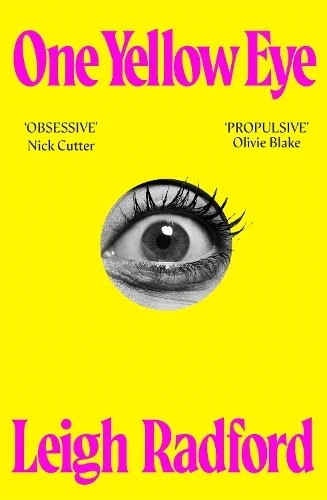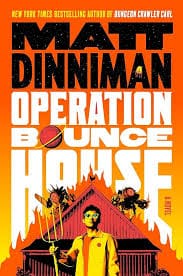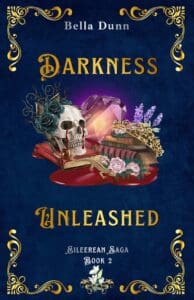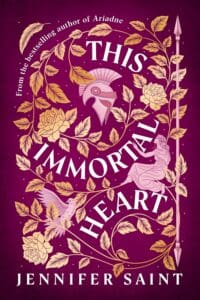
Synopsis:
A scientist by day, Kesta juggles intensive work under the microscope alongside Tim’s care, slipping him stolen drugs to keep him docile, knowing she is hiding the only zombie left. But Kesta is running out of drugs – and time. Can she save her husband before he is discovered? Or worse . . . will they trigger another outbreak?
Review:
Leigh Radford’s “One Yellow Eye,” is a hushed, aching, post-post apocalyptic story of grief, love, and the lengths we are willing to go to to keep that love alive. In many ways we’re having an era of maximalist horror, and I’m having a great time, I mean look at Chuck Tingle’s brand. “One Yellow Eye,” though defies that trend. It’s a stunning, slow-burn, and whilst it does deal with a pandemic, it tackles it in a deeply personal, raw and micro way. It’s not about saving the world, but a tiny piece of it… and I adored it. It does share a similarity with Tingle’s work though, in that both go to show that love is real and horror is never really heartless. The late Mason Coile (Andrew Pyper) blurbed this book, and said “You wouldn’t expect a zombie novel to have so much to say about love,” and frankly there is nothing I could tell you that sums up this book quite as perfectly as that does. Should the stars align, and I post this when I’m supposed to, this book releases tomorrow in the US: July 15th, from Gallery Books in the US and Tor Nightfire in the UK. My interview with Leigh should also be dropping tomorrow. I’m typing this April 22nd, a few weeks before we’re due to record, but I’m already predicting that it will be an excellent conversation, and I will be fan-girling hard. (Editors note (it’s me, I’m the editor): it was and and I was). You can find the interview below.
We follow Kesta Shelley, who along with the rest of London is recovering from a zombie pandemic. Zombie Apocalypse Recovery Groups (ZARGs) have cropped up, and terms like BTZ (before the zombies) have surfaced. As a doctor, Kesta wants nothing more than to get involved in the elusive “Project Dawn.” To the best of the rest of the world’s knowledge, there are no remaining cases, after all the infected were shot dead, but there’s no cure either. Kesta is particularly eager to contribute to this effort. It’s partly because she’s fed up of hiding her secret from her friends and neighbours, partly because she no longer wants to smuggle drugs from the hospital she works at back to her apartment, but mainly because her undead husband Tim is chained to her radiator, and she’s determined to bring him back.
The Covid-19 pandemic was such a strange time for me, and considering that 4 years on, my sense of smell is still AWOL, and my taste continues to function at about 60%, I truly don’t believe that really, society is over it yet. I know I’m not. We’ve just closed the tab. Collectively minimised it. The zombie virus that sweeps London in “One Yellow Eye,” is fiction and functionally different in a dozen ways- it would be amiss of me to drone on and on about Covid, but intentional or not, Radford brought a whole host of repressed lockdown memories and emotions bubbling to the surface. Tears were shed. Kesta, for all of her steely pragmatism, is as guilty of this repression as we are, attempting to pretend that her married life has not been completely dismantled and (only partially) reconstructed by the virus. Whilst trying to celebrate birthdays and anniversaries, she actually makes things a whole lot more painful for herself. It’s a performance, a pantomime, and in pretending nothing has changed, she underscores how everything has. It highlights how we shouldn’t fast-forward grief. It wasn’t just that our routines were rattled… our entire lives were put on hold. Trying to return to normality, without acknowledging that shift (which, from my perspective, is what we’ve done) isn’t healing but erasure. Of course this applies to all grief, not just the loss of my sense of smell. Please talk.
Infinitely more than it’s about the pandemic though, this book is about love. Messy, desperate and feral love. Many of the ZARG members in order to protect themselves and end the suffering and torment of their infected loved ones, killed them. It’s an impossible choice. It sounds brutal and it is brutal. When viewed through the lens of mercy, of dignity, of real compassion however, maybe it’s not so unthinkable after all. In many ways, for me, this book delicately brushes against various current ethical issues, such as euthenasia and autonomy. Is there such a thing as being cruel to be kind? Is there a point where love becomes letting go? Kesta goes to extreme lengths to preserve what is left of Tim. Her love for him is unshakable, irrational, and sacred. It’s indisputably, undeniably a form of love. Frankly I can’t say with any conviction that I wouldn’t hold on to the people I love with the same ferocity. If they were there, even half there, hey I might be tempted to chain them to a radiator too. Radford never explicitly moralises, simply leaves us to grapple with our own questions. When is holding on an act of cruelty rather than devotion? Who gets to decide that? There are no easy answers, simply a pulse, and somebody trying to keep it alive.
Words feel pitifully small compared to how “One Yellow Eye,” made me feel. How terrible and terrified I felt for Kesta and that horrible ethical, liminal space between holding on and letting go she found herself caught in. It truly is one of the most effective and affecting things I’ve read in years. It’s an important piece of contemporary horror, and I feel the need to reiterate once, and a thousand times more, that it is heartful. It’s beautiful and brutal in the same breath. It speaks to ethics, to grief, to devotion, to the quiet madness of carrying on when the world beneath your feet has shifted seismically. It touches on things that I couldn’t fit into this review, and things I wouldn’t dare to, for Leigh Radford, this book, and what it is trying to say, deserve far more than my paraphrasing. I don’t take this lightly dear reader- if you take one single recommendation from me this year, let it be “One Yellow Eye.”










Leave a Reply